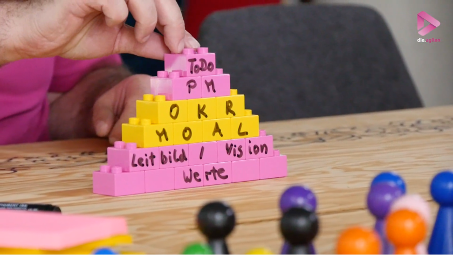The digitization of society and other technological advances will have a lasting impact on the labor market, change career paths and encourage companies to reorganize. This is often referred to as “Work 4.0”. If you take a closer look, this change has long since begun (Manager Magazin). For further investigation, this has Deutsche Telekom’s shareground team Together with the University of St. Gallen, 60 expert interviews on the subject of work 4.0 were carried out. I will briefly summarize the results for you in this article. Work 4.0 – act in today According to the study, work 4.0 should be established in companies today. The study sees 6 important pillars as drivers for the implementation of this so-called megatrend. A Culture of innovation should encourage employees to get involved – open spaces should encourage creativity. There is also talk of intrapreneurship. In the block Future work one speaks of time…
The topic of digital transformation is on everyone’s lips and is leading to a so-called “digital change” in many companies. According to many companies, this digital change first requires a digital strategy. But what does this mean for companies and what can such a digital strategy for digital change look like? Digital strategy To counteract the rapid pace of digital transformation, many sources suggest “transforming the company in an agile manner”. One Article on agility and digital transformation I have already published. A fundamental change from analog business models to digital is also in the foreground for the digital strategy. The basic idea in this blog is the structural change from companies to “agile” and “evolutionary” companies. Because in this way they can react flexibly and quickly to the coming complexity of the digital transformation. In the following, we will initially start with the fundamental structural change of companies as…
The digital transformation is hitting German companies like a steam hammer. To clarify this trend typified by many magazines, this article examines triggers, people and employees in digital transformation. To do this, I examined the hashtags future work, digital work and leading digital. The first part of the article examines why companies strive for “leading digital” and what this exactly means. In the second part, digital work is discussed as an answer to digital transformation. Leading digital Leading digital means market leadership through digital transformation of the company and / or the business model. The article deals with why companies are striving for this and how this change manifests itself exactly and which steps are necessary to implement it. The trigger of the digital transformation The digital transformation is called the rapid growth of technology launches in German companies. Through global markets and a high level of competition, companies strive…
The digital transformation is changing the world of work and, according to many authors, calls for agile leadership. One Article on the topic of agile leadership You will find here. Before that, I would like to turn to the topic of digital leadership. But first of all: what is this digital transformation actually? Due to the rapid increase in technologies, we speak of a “digital transformation” in every area. Famous examples include Apple, which has fundamentally digitized the music industry and has thus reacted to the new customer request: to have music anytime, anywhere. Kodak also had to fundamentally change its business model from analog cameras to digital ones. Many authors do not want to say whether the digital transformation is an evolution or a revolution and therefore speak of the “digital (r) evolution”. Along with this, the leadership and the world of work also change. This is under the…
Sociocracy, democracy and holacracy are currently on everyone’s lips. According to some media and journal papers, the three concepts are intended to represent the future of companies and could represent the next form of Company evolution after Laloux represent. However, it is not clear which one will really prevail and whether one will prevail at all. Below we will explain the advantages and disadvantages of all three models. The sociocratic enterprise and sociocracy Sociocracy (Latin: socius: companion and kratein: to govern) assumes that all parties involved are the same when it comes to managing decisions in a company. A decision is made as soon as there is no longer any serious counter-argument. The method therefore requires self-motivation, a cooperative togetherness and personal responsibility. In accordance with the Management Y principle, it also aims to ensure that employees “feel good” and therefore strive for self-realization in the company. Management X means…
Democratic companies? Several non-academic articles contain sentences such as: “Bye dictator”, “No more hierarchy” and “Democratic structures enter companies”. What you mean by that seems to be obvious: Employees are increasingly allowed to have a say in companies and now the first ideas are loud like: “Let’s choose the managers ourselves”. But let’s start from the beginning. I first went looking for literature in academic databases and found many empirical studies that democracy works very well, especially in the non-profit sector. Then I talked to some clubs I knew and noticed that these studies seem to be largely correct. The academic journal articles call for an empirical test in companies as well. The authors Sattelberger et al. with her book on “Democratic Enterprises”. Democracy in companies apparently offers another approach to a sustainable company alongside Sociocracy and Holocracy . How realistic is democracy in companies? The authors of the book…
More quickly! More quickly! More quickly! The world is turning faster and faster. Doesn’t that seem like that to you too? More and more projects and emails have to be processed every day and all of this in parallel. According to many authors, there is a clear problem here between external and internal requirements of the company. According to Brandes et al. the concept of sociocracy. What this means, I already have in explained another article. From this framework, the authors Brandes et al. the framework “Management Y”. More humanity in management According to the authors, successful organizations display a mature and humane culture. A paradigm shift from management X to management Y is taking place. Management Y serves the employee. People are not lazy, they are ready to make good contributions to something big. Living Management Y fundamentally changes our image of man from authority to serving management. Brandes…
The future of work in the context of the digitization of many areas of life is summarized under the term “Work 4.0”. Sounds simple, but in practice it is highly complicated: The buzzword “Work 4.0” conceals a plethora of unresolved labor law issues for employers, managers and employees Manager magazine . in the Article about work 4.0 Telekom and St. Gallen put forward some theses on the world of work 4.0. In this text I take the top 3 theses, which I consider realistic, and the top 3, which I don’t think will come true. The evaluation is based on my own opinion, the results of my research and with reference to the IT industry. For each thesis I also present some further articles, as far as possible. Reading tip. What is work 4.0 Statements about the world of work 4.0, which are likely The role of people in the…
The digitization and networking of the economy with the use of new technologies, with new automation processes and new business models also has consequences for the world of work. Office work as we currently know it could change and bring opportunities and risks with it. This text deals with the opportunities offered by digitization. Work-life balance Home office and mobile work stand for free time management, a lack of commuting, greater personal responsibility and the compatibility of work and family. Demotivating the need to control and distrust. Anyone who sits in the home office can work more independently or at least feels that way says that Magazine CIO . The magazine also says: Many employees who work long days complain that they “get nothing else”. I mean shopping, washing clothes, repairing the bike. All of this has to take place on the weekend because between Monday and Friday the person…
Digitization will change working life considerably in the coming years – in almost all areas. If you don’t prepare, you will have a problem, one of those Articles from the world. The digital change is therefore increasingly changing our professional life. Without computers and the Internet, work stands still in many companies today. Craftsmen manufacture furniture or car parts with digital help, architects create construction plans in no time at all, where they had to make elaborate drawings beforehand. Employees are connected to one another via social networks, digital programs facilitate work processes and agreements with one another. Employees can concentrate on essential tasks and are no longer overloaded with administrative tasks, for example (source: Education experts ). Digitization in the workplace: Home offices are usually better equipped than the office In the Study by WiWo on digitization in the workplace can be summarized as follows: ” Digitization is more…










